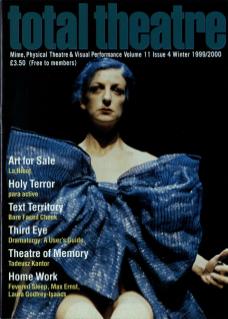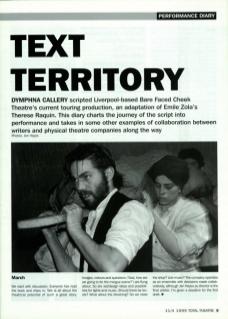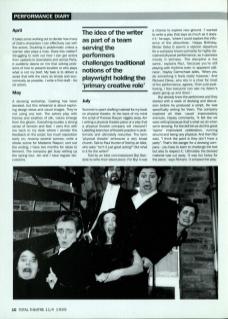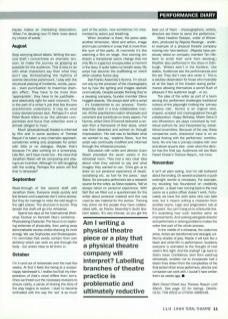March
We start with discussion. Everyone has read the book and chips in. Talk is all about the theatrical potential of such a great story.
Images, colours and questions ('God, how are we going to do the morgue scene?') are flung about. So are set/design ideas and possibilities for lights and music. Should there be levels? What about the drowning? Do we need the shop? Live music? The company operates as an ensemble with decisions made collaboratively, although Jen Heyes as director is the final arbiter. I'm given a deadline for the first draft.
April
It takes some working out to decide how many of Zola's characters I can effectively use with five actors. Doubling is problematic unless a woman also plays a man. Does this matter? Struggling to work out how I can get actors from upstairs to downstairs and across Paris, it suddenly dawns on me that solving problems of how to present location or who plays what is not my brief. My task is to deliver a script that tells the story as simply and economically as possible. I write a first draft – for six actors.
May
A devising workshop. Casting has been decided, but this rehearsal is about exploring design ideas and visual images. They're not using any text. The actors play with frames and swathes of silk, voices emerge from the gloom. Everything exudes a strong sense of tension and fear. I carry this with me back to my desk where I ponder the feedback on the script: too much exposition early on; revamp several scenes; write a stroke scene for Madame Raquin; sort out the ending. I have two months for ideas to ferment. The company get busy setting up the spring tour. Jen and I have regular discussions.
July
Summer is spent drafting material for my book on physical theatre. At the back of my mind the script of Therese Raquin niggles away. Am I writing a physical theatre piece or a play that a physical theatre company will interpret? Labelling branches of theatre practice is problematic and ultimately reductive. The term ‘physical theatre' embraces a very broad church. Talk to Paul Hunter of Told by an Idiot, who asks: 'Isn't it just good acting?' But what is it for the writer?
Told by an Idiot commissioned Biyi Bandele to write their latest piece. For Biyi it was a chance to explore new ground. ‘I wanted to write a play that says as much as it doesn’t,' he says, 'where I could explore the influence of the absurdists.' Happy Birthday, Mister Deka D seems a stylistic departure for a company known primarily for highly disciplined physical performance, as it operates mostly in stillness. ‘The discipline is the same,' explains Paul, because you're still playing with rhythms even in apparent stillness.' Hayley Carmichael adds, 'When you do something it feels really massive.' And Richard Clews, who sits in a chair for most of the performance, agrees, 'Even just swallowing, I feel everyone can see my Adam's apple going up and down.'
Biyi already knew the performers and they started with a week of devising and discussion before he produced a script. He was specifically writing for them. The company explored all their 'usual' improvisatory avenues. Hayley comments, 'It felt like we were writing because that's what we do when we're devising. For the drill bit we did this great “opera” improvised celebration, running around and being very physical. And then Biyi said, "I think the point is they don't have a party." That's the danger for a devising company – you have to learn to challenge the text but also to respect it.' Ultimately the devised material was cut away. 'It was too heavy for the piece,' says Richard, 'it eclipsed the play.'
Hayley makes an interesting observation, ‘When I'm devising now I'll think more about my choice of words.'
August
Stop worrying about labels. Writing the second draft I concentrate on dramatic tension, to make the journey as gripping as possible for the audience. This is less to do with what characters say than what they don't say. Orchestrating the rhythms of scenes becomes paramount. I play with the structural placing of incidents, words, pauses – even punctuation to maximise dramatic effect. They have to be more than 'appropriate', they have to be justifiable and absolutely right for each moment. This is the part of a writer's job that few theatre practitioners understand. It may be what many devised pieces lack. Perhaps it's what Peter Brook refers to as ‘the ultimate compactness and focus that collective work is almost obliged to miss'.
Much (physical/visual) theatre is informed by film and in some sections of Therese Raquin I've taken a very cinematic approach, sometimes writing only proposals for action with little or no dialogue. Maybe that's because I'm also working on a screenplay. Like film, we'll have music too. the news that Jonathan Raisin will be composing and playing is an incentive. Although I'm still struggling with the ending. Perhaps the actors will find that in rehearsal?
September
Read through of the second draft with Jonathan there. Everyone reads quickly and the tension and suspense don't come across. But they do manage to raise the odd laugh in the right places. The structure is sound. They decide this draft will go into rehearsal.
Spend two days at the International Workshop Festival on Kenneth Rea's workshop – Physicalising Character. The focus is on exploring extremes of physicality, then paring away demonstrable excess whilst retaining its inner energy. We use Sophocles and Shakespeare. I'm reminded that words contain their own alchemy which can work on and through the body – but actors have to let them in.
October
I'm in and out of rehearsals over the next few weeks. At first it feels like being at a scissor-happy hairdressers. I realise too that my interpretation of Zola's novel differs from Jen's. Once we thrash out the necessary revisions to ensure clarity, a sense of sharing the story of the play begins to evolve. I start to become enthralled with the way the 'set' is so much part of the action, how sometimes I'm mesmerised by actors just breathing.
When Jonathan is there, the piano adds another dimension. Word and action, image and music combine in a way that is more than the sum of the parts. At moments it's like watching a film on stage. One evening Jen directs a transitional scene change that not only fills in a gap but encapsulates a moment in the story. It quite takes my breath away. My script has become the scaffolding on which other creative forces play.
See Frantic Assembly's Hymns. I'm struck not only by the precision of the choreography but by how the lighting and images operate cinematically. Despite people thinking they're a devising company, founder member Steve Hoggett asserts, 'We always start with a script – it's fundamental to our process.’ Frantic Assembly work in a truly collaborative manner. All the practitioners watch rehearsals and comment and contribute on every aspect. For Hymns, writer Chris O'Connell delivered a version from a framework of their ideas, which was then dissected and worked on through improvisation. ‘His role was to facilitate what we wanted to say,’ explains Steve, ‘but the script was continually modified and informed through the rehearsal process.’
Discussion with writer and director (Liam Steel) preceded the seven weeks in the rehearsal room. They had a very clear idea about what they wanted to say and what imagery they wanted to use. 'Chris got us to draw on our personal experience of death, socialising, etc as fuel for the piece,' says Steve. So company performers are a research source for the writer, as Steve explains, 'We've always relied on personal experience. With Sell Out we filled out a questionnaire for the writer about personal material and this was used as raw material for the stories.' Training has come via the people they have collaborated with, as Frantic Assembly's Scott Graham states, 'It's very intense, so you get the best out of them - choreographers, writers, directors are there to serve the performers.’
Meet Heather Robson, writer of Whoredom, produced by Rejects Revenge – another example of a physical theatre company moving into 'text-territory’. (Rejects have previously relied on company member Tim Hibberd to script their work from devising.) Heather also performed in the show in Edinburgh. ‘Writers aren't in the frontline,' she states. ‘Audiences see the performances and the set. They don't care who wrote it.' This is a salutary observation for those who invariably sit at the back of the theatre during performance allowing themselves a secret flush of pleasure if the audience laugh – or cry.
The idea of the writer as part of a team serving the performers challenges traditional notions of the playwright holding the ‘primary creative role'. Hymns is an original idea, shaped, scripted and choreographed through collaboration. Happy Birthday, Mister Deka D and Whoredom are plays conceived by individual authors for, and interpreted by, established ensembles. Because of the way these companies work, directorial input is on an equal footing with the performers' contributions. No one has a 'primary creative role' over and above anyone else – even when the director has the final say. Audiences will see Bare Faced Cheek's Therese Raquin, not mine.
November
It isn't all plain sailing. And I'm still bothered about the ending – on several occasions a quick overnight rewrite is necessary. For example, my doubling has floundered on credibility grounds – a dead man coming back in the next scene as a police officer doesn't work. Fortunately we have the sixth actor who can take over, but it means cutting a character from another scene. Logic and pragmatism rule at this point. You can't hang on to a favourite line. It's surprising how such rewrites serve as improvements. And working alongside director and performers in solving problems makes the writer feel part of the whole process.
In the middle of a rehearsal, the costumes arrive. Actors are transformed and strangely unified by shades of grey. Maybe it will look like a black and white film in performance. Suddenly everyone is animated at the thought of next week's first night. And the ending? I go back to Zola's novel. Confidence, born from watching rehearsals, enables me to incorporate half a dozen lines drawn from the complexities of the final section that I know performers, director and composer can work with. I couldn't have written them six weeks ago.



